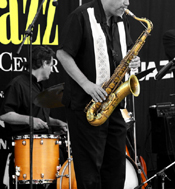WSJ on YouTube copyright infringement: Universal Music 'paranoid'


In “Whose Tube? Arts Tube!,” a “free” story of the day offered by the WSJ.com to spur sales of its $79 subscription product, Teachout backs up his dissing of Universal Music, by proclaiming Warner Music, “Universal's smarter competitor” because it was able to come to terms on a future “deal” with YouTube.
Why does Teachout take on Universal Music for doing what it deems necessary to enforce copyright law and preserve the integrity of its assets? Teachout believes he has come up with a better business model: “Disseminating high-culture TV and radio programming for free via the Web” because it is “among the simplest and most cost-effective ways to expand the audience for the fine arts.”
Of course the YouTube copyright agnostic method of distribution is cost-effective, YouTube is not compensating content creators and owners for its exploitation of their content. YouTubers, such as Teachout himself, are also benefiting from their cost-free reuse of pirated video content found at YouTube.Teachout laments:
some of the copyright holders are requesting that their videos be pulled from YouTube. (I just lost two terrific Bill Evans clips that way.)
Teachout believes economic theory supports his contention that copyright owners are “paranoid” to demand compensation for exploitation of their content:
As any economist can tell you, supply creates its own demand…Every time a Web surfer in South Dakota or South Africa views a YouTube video by Louis Armstrong or Arturo Toscanini, he's making a discovery that could change his life -- not to mention his concert-going and record-buying habits. I can't think of a better bargain.
There are many economists that will not say “supply creates its own demand” and The Wall Street Journal itself can undoubtedly confirm that a few “free” article postings do not necessarily result in paid subscriptions.
Who IS getting the “better bargain” at YouTube?:
- YouTube and its royalty-free use of copyright content
- YouTubers and their cost-free use of copyright content
Teachout celebrates the bounty of pirated videos he is able to enjoy without paying a cent to the creators or owners of the content, “thanks” to YouTube’s Hurley and Chen:
In recent months, jazz-loving friends have been sending me YouTube links to videos by Louis Armstrong, Duke Ellington and other celebrated artists, most of them drawn from films of the '30s and '40s and TV shows of the '50s and '60s. Some of this material is available on DVD, but most of it lingered in limbo until Chad Hurley and Steve Chen, YouTube's co-founders, made it possible for anyone with a computer to post and view video clips at will.
Teachout revels in spreading the copyright infringement gospel and created:
a list of links to performances by Armstrong, Ellington, Count Basie, Pablo Casals, the King Cole Trio, Miles Davis, Dietrich Fischer-Dieskau, Wilhelm Furtwängler, Benny Goodman, Jascha Heifetz, Billie Holiday, Charlie Parker, Andrés Segovia, Bessie Smith, Arturo Toscanini and numerous other musicians of comparable significance. All can be viewed free, whenever you want.
Perhaps Teachout’s next content democratization project will be to help tear down the pesky Wall Street Journal pay walls so that all Wall Street Journal stories can be read “free, whenever you want.” Teachout already has his economic argument: “supply creates its own demand.”
ALSO SEE: YouTube barter economy: Where is the cash?
NBC on YouTube: great for promos, but no money in sight
Google, YouTube: multi-billion dollar "fair-use" risky bets
Web 2.0 Bill of Rights: Free content, users control, Websites are public goods
YouTube, MySpace at risk: UMG seeks millions of dolars from "copyright infingers"